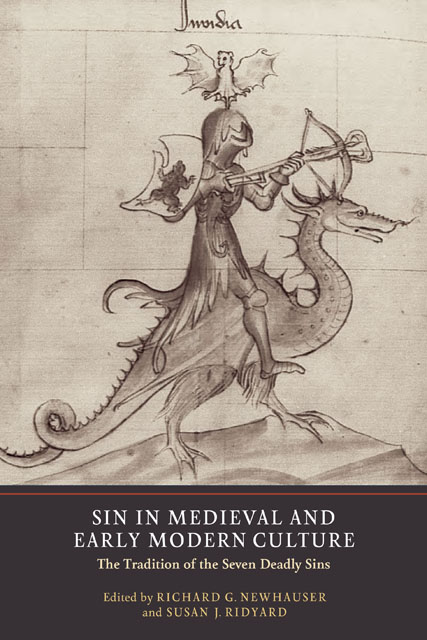Introduction
Published online by Cambridge University Press: 28 February 2023
Summary
The study of the vices has developed new sets of interests since the first vigorous and now classic examination in English of the topic of the seven deadly sins by Morton Bloomfield. The present collection of essays, which were initiated in a Summer Seminar in 2006 sponsored by the National Endowment for the Humanities and at the annual Sewanee Medieval Colloquium in 2007, offers to readers in a variety of disciplines some of the newest research in these areas. Bloomfield’s pioneering work built on the scholarship of earlier generations and surveyed an impressive number of occurrences of the capital vices in discursive and literary texts from Late Antiquity to the end of the Middle Ages. His pathbreaking work on the vices also came to include the survey of Latin manuscripts transmitting information on the sins and virtues in the later Middle Ages. As the use of Bloomfield’s scholarship by a number of the contributions to the present volume demonstrates, his work has remained consistently important since the date of its initial publication, though at times as much for the questions it did not ask as for those it opened up to further critical inquiry. It set the stage for an understanding of the utility of examining the vices in the context of the history of ideas and of monastic psychology, and especially as the inspirations for literary creativity in the Middle Ages, and in particular in Middle English literature. The essays here by Peter S. Hawkins and Carol Jamison (on Dante and Gower respectively) and James B. Williams (on Carolingian monasticism) take up lines of inquiry begun by Bloomfield, but they also reveal the deepening awareness, especially in the past decade, of the need to critically contextualize the role played by the sins in an author’s oeuvre or an ecclesiastical institution. Such critically framed historical and social concerns, the need to embed the vices in the cultural practices they can be seen articulating and the social (un)acceptability of the behavior they helped define, were given at times brief space at best in Bloomfield’s study.
Many other areas represented in the present collection have emerged in the past decade as fruitful avenues for research unanticipated by Bloomfield.
- Type
- Chapter
- Information
- Sin in Medieval and Early Modern CultureThe Tradition of the Seven Deadly Sins, pp. 1 - 16Publisher: Boydell & BrewerPrint publication year: 2012



